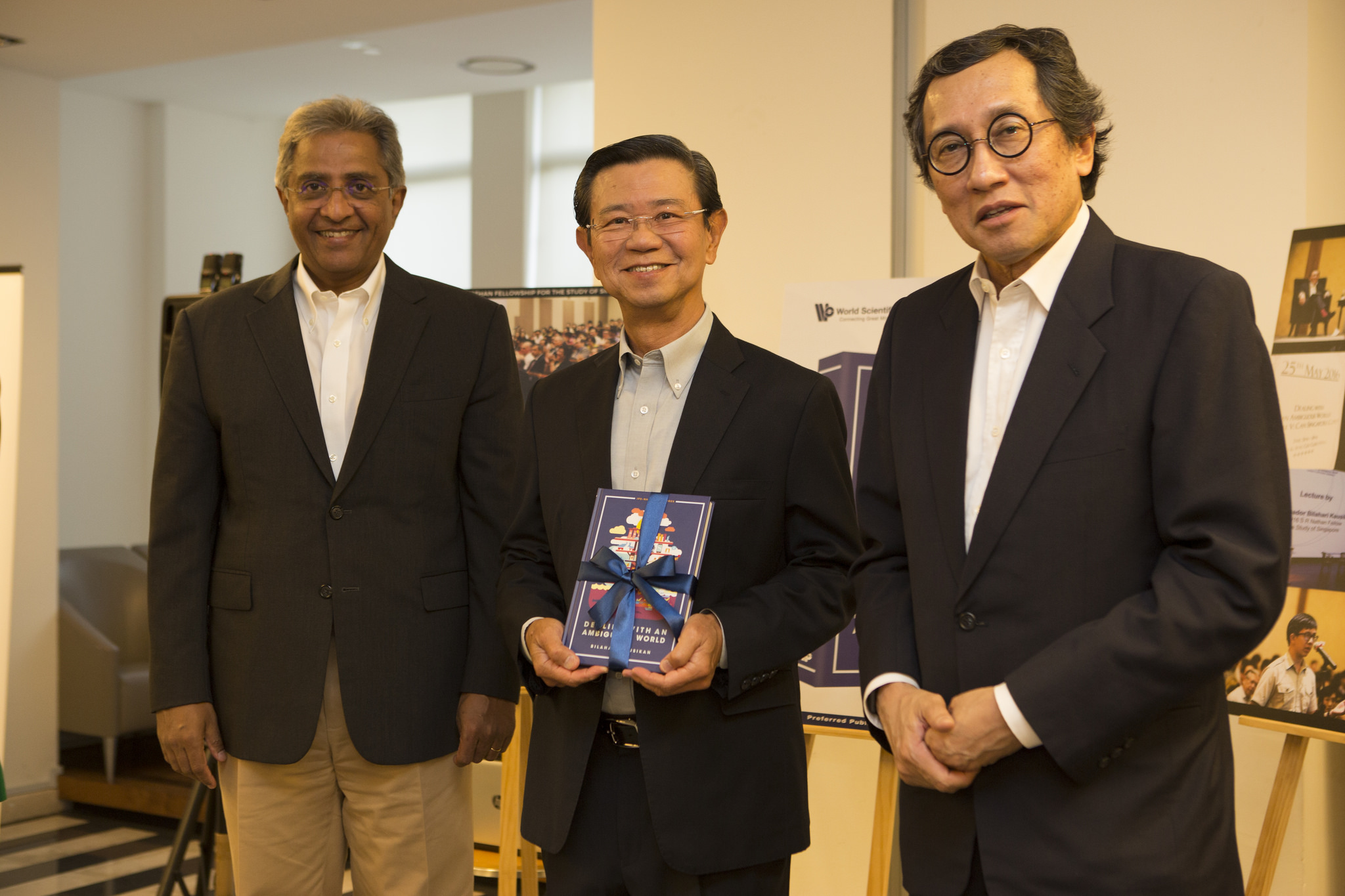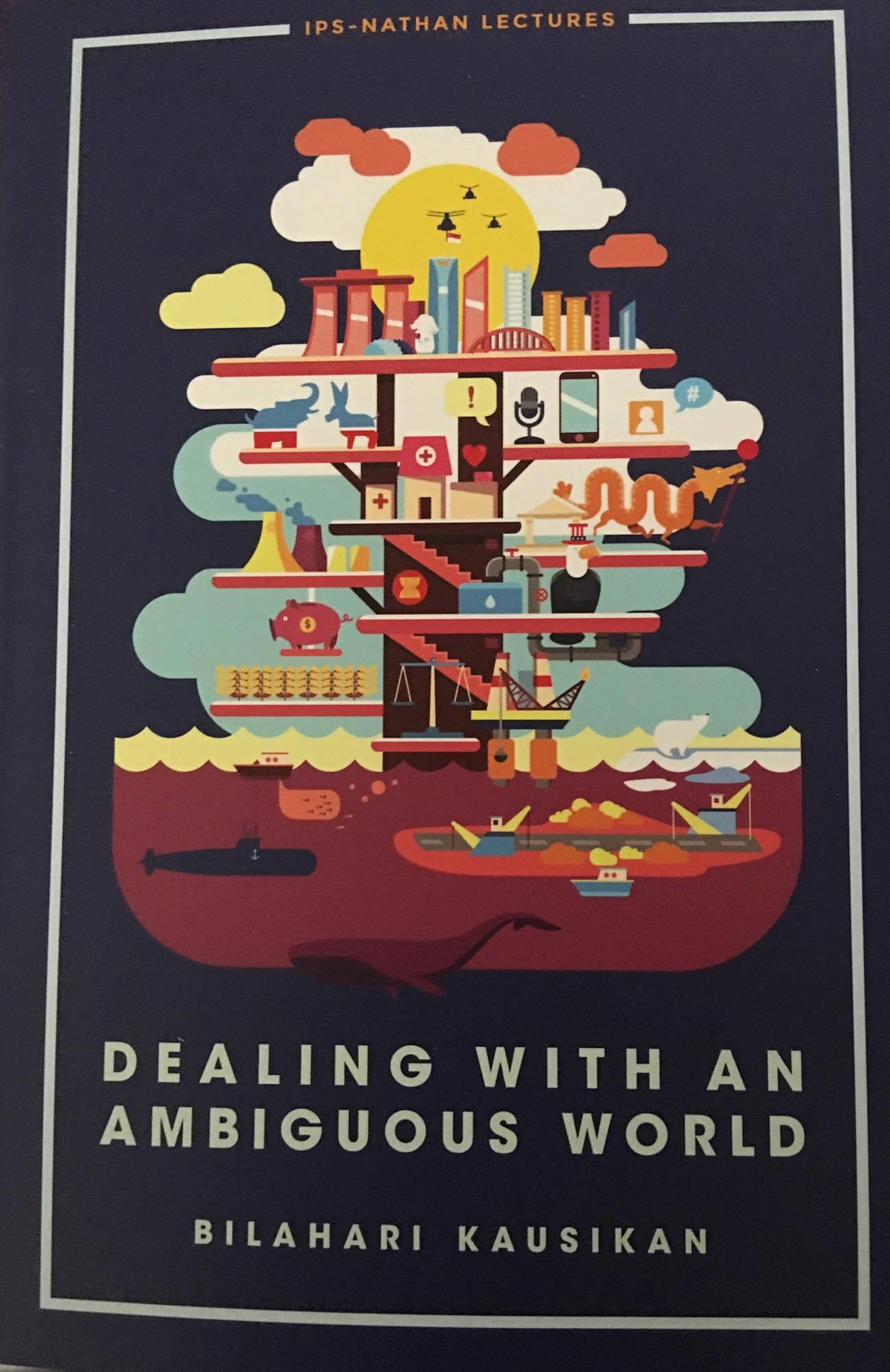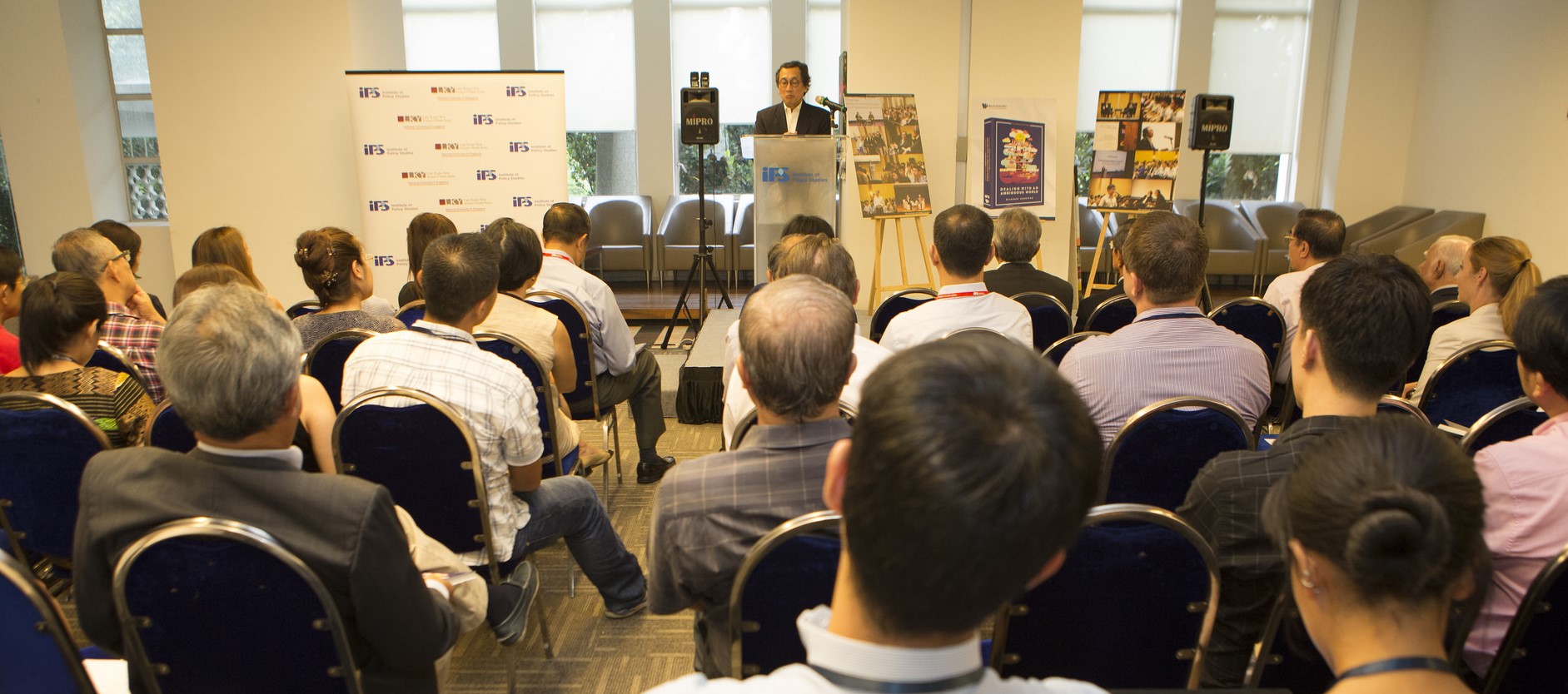It appears that none of the mainstream media was at the Lee Kuan Yew School of Public Policy to report about Institute of Policy Studies' 2015/16 S R Nathan Fellow Bilahari Kausikan's book launch last evening (18 Oct).
Perhaps they thought that the book by the former Permanent Secretary of the Ministry of Foreign Affairs (MFA) was nothing more than just a collation of the five public lectures, which he had previously delivered as an S R Nathan Fellow.
Nothing new and not newsworthy? Not quite.
At the launch of his book, "Dealing with an Ambiguous World", Bilahari treated his audience to a bonus mini lecture on the current state of international affairs.
 Bilahari with guest of honour Wong Kan Seng and IPS Director Janadas Devan.
Bilahari with guest of honour Wong Kan Seng and IPS Director Janadas Devan.
So mainstream media, this was what you missed last night:
1. Bilahari's intent for his public lectures is to alert Singaporeans to the possibility of external attempts at influencing Singapore's foreign policy decisions.
He used the South China sea issue as an example, highlighting how the Chinese used its tabloid as one of its diplomatic chess pieces to pressure Singapore:
"Diplomacy is not always polite and not always conducted by diplomats. Recently China has made the point more memorably than I could ever have done. I am referring to the noisy kerfuffle between Global Times and our Ambassador in Beijing when he attempted to correct its misrepresentations of our foreign policy. We should not get rattled because that is the purpose of the whole incident. This was not the first time such noises have been made; it will not be the last time."
Bilahari added that Singapore's bilateral ties with China is actually quite good, but it doesn't mean that we should subordinate our interests on the basis of our good relationship and China's size:
"We of course want a good relationship with China as we want a good relationship with all countries. In fact our relationship with China is on the whole quite good. But the basis of a good relationship cannot be the expectation that we must subordinate our national interests to the interests of a bigger country merely because it is bigger, whether the bigger country is China, our neighbours or the US – with whom we have had some very noisy episodes too -- or any other country. After all, almost every country is bigger than Singapore. If we accept subordination on the basis of size, where will it end?
There is bound to be disagreements from time-to time even in the best of relationships. We are a sovereign country and while we respect the interests of other sovereign countries, it is not unreasonable to expect the same respect for our interests. I do not want to dwell on the matter, but the first step for Singaporeans to deal with such incidents is to be aware of and understand the game."
2. Amidst Donald Trump's candidacy in the US and Brexit in the UK, Bilahari highlighted a global trend that will not be going away anytime soon -- the rise of outsiders that tapped on the disillusionment with the established political order and the anger caused by globalization’s flaws.
Let Bilahari explain it in a more articulate fashion:
"And yet they (Trump, rise of extreme right-wing movements in Europe) all have something in common and are all drinking from much the same political well. They represent the rise of outsiders: populists tapping on nostalgia for an imagined past or the emotions of those caught on the wrong side of globalization’s inequalities; sustained by and stoking anti-foreign sentiment. They all display different degrees of insistent nationalism. They all represent a certain disillusionment with the established political order."
And here are Bilahari's analyses of some of these movements summed up in roughly 140-character tweets:
On Trump: He is "channelling the dissatisfactions of the white, non-college educated lower-middle and working classes who had hitherto only grumbled in dives but have now found a public voice, ironically that of a billionaire".
On Brexit: It "exposed the fecklessness of the British ruling class whether of the ‘Stay’ or ‘Leave’ camps, although much more so the latter".
On right-wing movements in Europe: They "are a consequence of the arrogance of the European political elite who were so blinded by the splendour of their own vision of Europe that they brushed aside the concerns of their electorates".
Bilahari also mentioned the Philippines (President Duterte) and Indonesia (President Joko Widodo) to underscore that this is not just a western phenomenon.
3. Lastly, Bilahari gave a quick analysis on how the developments in the US, the Philippines and Indonesia may have an impact on Singapore.
On the US,
"It is increasingly difficult to see how Mr Trump can chart a path to the 270 Electoral College votes he needs to become President. His election is highly improbable though not yet impossible...the mood he represents is not going to disappear on the 9th of November and America will remain a divided and distracted country for some time.
A President Clinton cannot be the same as Secretary of State Clinton and this will have an influence on the US-China adjustments that are underway. Developments in post-election US and a post-Brexit EU whose protectionist instincts may well be enhanced without the UK’s moderating influence could act and react on each other with strategic consequences for our region".
On the Philippines,
"President Duterte will visit China very soon. He hopes to cut a deal on the South China Sea. A deal is not a bad thing – a lowering of tensions cannot be bad – but it has to be a deal that does not compromise fundamental principles important to both claimant and non-claimant states."
On Indonesia,
"We are fortunate that Pak Jokowi although part of the same global phenomenon, is not extreme and friendly. Of course he is a nationalist, which Indonesian is not? Who is not? I am a nationalist and so I am sure are you.
Nationalism in itself is not a bad thing. That Pak Jokowi is a nationalist who wants the best for his people but is not part of the traditional Indonesian political elite and is himself from a relatively humble background, is probably a good thing."
And how President Jokowi, as a nationalist, has had a positive impact on both Indonesia and the region:
"Let me give you one example. Pak Jokowi is the first Indonesian leader that I can recall since the haze first started in 1997, to whom it has occurred – sincerely occurred -- that the main victims of haze are not Singaporeans or Malaysians or Bruneians but ordinary Indonesians who live in the affected areas and whose health and livelihoods have grievously suffered from the environmental devastation. He wants to do the right thing for his people and has begun to act to alleviate their situation."
And one last thing -- his book.

Even if you have followed his five public lectures online, the book is worth a read because of his illuminating foreword on the study of international relations (history, literature, and philosophy are better preparations for international relations work), the transcripts of his hilariously candid Q&A sessions with his audience, and his speeches on the late Lee Kuan Yew and S R Nathan.
Bilahari’s book, “Dealing with an Ambiguous World”, is available at major bookstores in Singapore. Check out our Facebook page (have you liked it yet?) to win one of the five signed copies.
Photos from Institute of Policy Studies Flickr.
If you like what you read, follow us on Facebook and Twitter to get the latest updates.
If you like what you read, follow us on Facebook, Instagram, Twitter and Telegram to get the latest updates.
